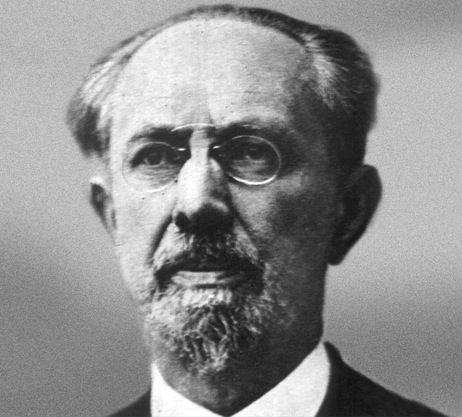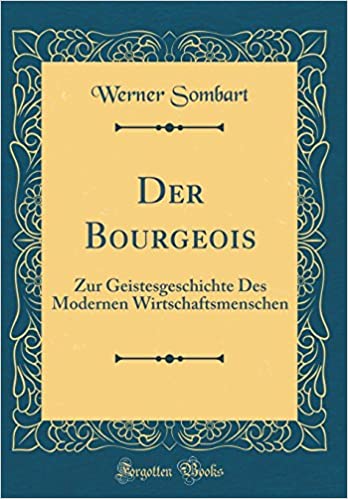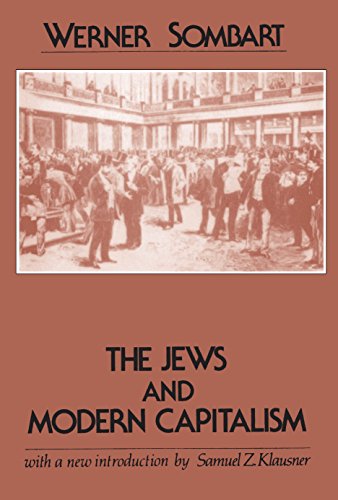I was planning on doing a thread on Werner Sombart's "The Jews and Modern Capitalism", but I read half of it and preceded to read several articles on his career, all of his work, and his specific ideas/arguments. I found them so interesting that I thought I needed to tweet about
all of them. After reading his work and the articles about him, I cant see why he is not more widely read. Quick caveat, I wrote this thread based off a few notes and the books I looked at were out of order in terms of date, I hope this doesn't confuse anyone.
Sombart began his career as a socialist in the Marxist vein, but developed a type of socialism that embraced attitudes rooted in aristocratic, traditionalist, and patriarchal attitudes that Marxist social theory sought to devalue. In his 1903 work "Die deutsche Volkswirtshaft im
neunzehnten Jahrhundert" he decried the teleology and focus on the social progress of Marxism, instead looking to the model of the medieval guild community, the development of the personality of the producer in his work, the shaping of the productive aspects of society
on the model of the family. The replacement of this organic society by the artificial community was consolidated by the interference of the Jew in German society since the Jew was marked by abstraction in thought which is associated with indifference to all qualitative values.The
ultimate expression of the Jewish capacity for abstraction was money which dissolved all aspects of productive and material life to their quantitative value. The proletariat, which is a social product of capitalism, is the class that suffers most from this. Sombart thought that a
materialist and commercial ethos sat well with the bourgeoise, but the actual working class suffered from not having a more patriarchal social ethos and traditional notions of community. Another major distinction between Sombarts view of socialism and Marxism was his distinction
between the trader and the entrepreneur. Where Marx saw the entrepreneur as another historical product of capitalism, Sombart championed the creative and organizational aspects of the entrepreneur against the merely rationalist characteristics of the trader. The entrepreneur in
Sombart's view is an economic representation of the typical Faustian spirit of Germanic heroism while he associated the trader with the foreigner, particularly the characteristics of Jews and the English.
In his two most important books "Die Juden und Das Wirtschaftsleben" and "Der Bourgeois" written between 1911-1913, Sombart located the origins of bourgeois attitudes and modern capitalism, not in Protestantism as Weber argued, but in Judaism (Even Weber reframed his
argument upon reading Sombart). Sombart was an opponent of Weberian and Catholic interpretation of Protestantism, arguing that Lutheranism encouraged a deepening religious feeling. and other forms of Protestantism were marked by a generally anti-capitalistic spirit. At most took
over the existing capitalist economic life of the Catholics. The real source of the development of the late capitalist society is, according to Sombart, the Jewish mind, which first introduced the characteristics of modern capitalism, specifically the profit motive
through free-trade, usury and ruthless business practice stemming from religious codes from middle ages on dealings with non-Jews. Capitalism was hereditary in the religion itself, a product of the intellect, thought and purpose projected into the world of organisms
and nature itself. For Sombart, Capitalism, and Judaism itself, were alien and disconnected from the natural world.
The father of modern capitalism was usury and money lending, a unique practice of medieval western Jewry. According to Sombart, European economic life, prior to
The father of modern capitalism was usury and money lending, a unique practice of medieval western Jewry. According to Sombart, European economic life, prior to
capitalism, had inherent restraint's to profit-making (both social and legal, organic and inorganic) however, Jewish usury only saw maximization of profit as goal of economics. Because this notion of economic life was fundamentally foreign to him, western man had to be remade to
fit this growing economic status quo, stripped from his natural and organic qualities into a purely rational mechanism or subject. All social, economic and political arrangements that are personal are foreign to them. The Jew's whole being is opposed to what we understood as
chivalry, knighthood, feudalism, and patriarchy.
Sombart's most explicit work based in his political/economic worldview was his 1934 work "Duetscher Sozialismus" written after he joined the NSDAP. Most of this work seemed to be a rehash of a lot of his critiques of Marxian
Sombart's most explicit work based in his political/economic worldview was his 1934 work "Duetscher Sozialismus" written after he joined the NSDAP. Most of this work seemed to be a rehash of a lot of his critiques of Marxian
socialism and how a perfected German or national socialism could heal Germany and the western world. However unlike his other works, Sombart provided prescriptive plan for how to deal with both capitalism and what he saw as the JQ. As for Jews, he suggested the transformation of
institutions in such a way that they could no longer facilitate the Jewish spirit. The economic policy of the state must also be one directed in a corporative manner based on estates and guilds, free from penetration by Jewish exploitation.
Politically, a new legal order would surpass rights of individuals to social obligation and the welfare of the whole, directed by the state. Economics would be beholden to politics and not the other way around. The state would incentivize those aspects of material and economic
life that was suited best (agriculture over traditional industry although Sombart was not against industrialization).
In his book "Handler und Heden" written in 1915, Sombart believed his economic contrast between Germans vs the Jews and English applied to the sociological significance of WWI between the English and the Germans seeing it in terms of the radical difference between the trader or
commercial ethos which aims at achieving happiness and comfort through the notions of humility, industry, contentedness, privacy which will facilitate peace in an interconnected world of traders and Germanic heroism which aims at fulfilling the mission of life as a task of
higher self actualization and life affirming virtues of sacrifice, loyalty, valour obedience, goodness, and a martial ethos. War for the English was a commercial enterprise whereas for the Germans it was a defense of his fatherland and a defense against the influence of the

 Read on Twitter
Read on Twitter






